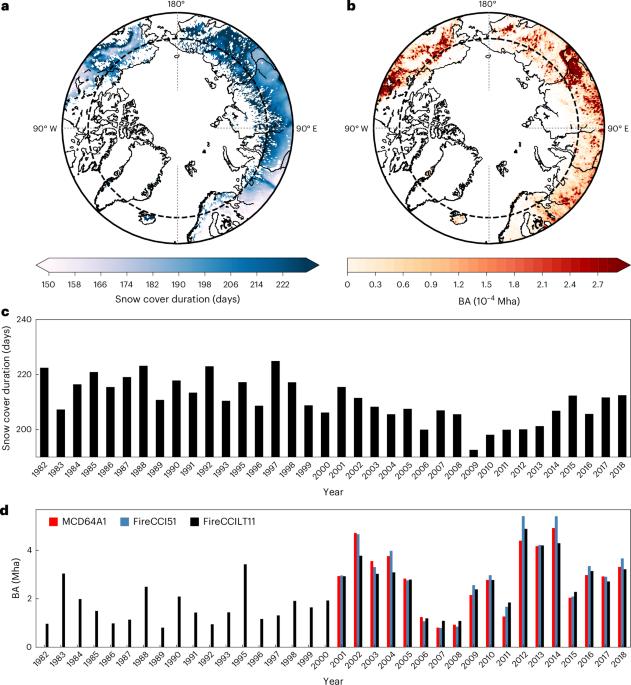在气候变暖的情况下,为了应对野火,北极积雪的延迟形成
IF 27.1
1区 地球科学
Q1 ENVIRONMENTAL SCIENCES
引用次数: 0
摘要
季节性积雪覆盖地区的野火会对积雪和碳储量产生持久的影响。在这里,我们使用长期卫星数据显示,从1982年到2018年,北极的燃烧面积显着增加,而积雪持续时间显着减少。XGBoost机器学习模型和因果分析证实了野火在延迟积雪形成方面的作用,这种影响与火灾引起的反照率降低和温度升高密切相关。此外,我们观察到,在重大野火之后,积雪形成的延迟超过5天。展望未来,我们在高排放情景下的预测(共享社会经济路径,SSP 5-8.5)表明,与历史平均值相比,2015年至2100年期间,燃烧面积可能增加2.6倍,年平均积雪持续时间可能减少近18天。在高纬度地区,野火变得越来越频繁。在这里,作者表明,这些火灾延缓了北极积雪的形成,由于燃烧面积的增加,未来变暖将加剧北极积雪的形成。本文章由计算机程序翻译,如有差异,请以英文原文为准。

Delayed formation of Arctic snow cover in response to wildland fires in a warming climate
Wildland fires in seasonally snow-covered areas can have lasting effects on both the snowpack and carbon stocks. Here, using long-term satellite data, we show that from 1982 to 2018, the burned area in the Arctic has significantly increased, while the duration of snow cover has significantly decreased. An XGBoost machine learning model and causal analysis confirmed the role of wildland fires in delaying snow cover formation, with this effect strongly linked to fire-induced reductions in albedo and increases in temperature. In addition, we observed a delay of more than 5 days in snow cover formation following major wildland fires. Looking ahead, our projections under a high-emissions scenario (Shared Socioeconomic Pathway, SSP 5-8.5) indicate that the burned area could increase by a factor of 2.6 and the annual mean snow cover duration could decrease by nearly 18 days between 2015 and 2100 compared with the historical average. Wildland fires are becoming more frequent in high-latitude regions. Here the authors show that these fires delay the formation of snow cover in the Arctic, which will be exacerbated under future warming due to increases in burned areas.
求助全文
通过发布文献求助,成功后即可免费获取论文全文。
去求助
来源期刊

Nature Climate Change
ENVIRONMENTAL SCIENCES-METEOROLOGY & ATMOSPHERIC SCIENCES
CiteScore
40.30
自引率
1.60%
发文量
267
审稿时长
4-8 weeks
期刊介绍:
Nature Climate Change is dedicated to addressing the scientific challenge of understanding Earth's changing climate and its societal implications. As a monthly journal, it publishes significant and cutting-edge research on the nature, causes, and impacts of global climate change, as well as its implications for the economy, policy, and the world at large.
The journal publishes original research spanning the natural and social sciences, synthesizing interdisciplinary research to provide a comprehensive understanding of climate change. It upholds the high standards set by all Nature-branded journals, ensuring top-tier original research through a fair and rigorous review process, broad readership access, high standards of copy editing and production, rapid publication, and independence from academic societies and other vested interests.
Nature Climate Change serves as a platform for discussion among experts, publishing opinion, analysis, and review articles. It also features Research Highlights to highlight important developments in the field and original reporting from renowned science journalists in the form of feature articles.
Topics covered in the journal include adaptation, atmospheric science, ecology, economics, energy, impacts and vulnerability, mitigation, oceanography, policy, sociology, and sustainability, among others.
 求助内容:
求助内容: 应助结果提醒方式:
应助结果提醒方式:


